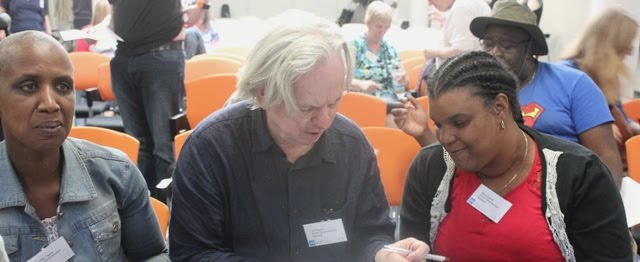Clenton Farquharson and Nic Crosby. Clenton Farquharson MBE is chair of the Think Personal Act Local Board. Nic Crosby is Director at GatherBuildWork.net. Both are happy to continue this discussion should you be interested.
We are all people, people with lived experience,
experts by experience; we may need support all our life or we’ve all looked
after a family member who does, we’ve worried about how they are getting on in
hospital, whether people are looking after them properly, many of us have
experienced mental health challenges and most if not all know someone close who
has…the list goes on.
Real co-production is about building mutually trusting
and respectful relationships, where we each listen and value each other
contributions, discuss, often disagree, and may be even argue. We are all people with lived experience and
we are, when it comes to taking forward the improvement of support for people,
actually working to make the world a better place for ourselves and our own
families, relations, friends and local communities.
Yet, there is this great divide between those of us
being supported and those of us doing the supporting, where those of us being
supported report that although there is a much headlined approach of ‘nothing
about us without us’ our experiences are nothing like this. We, who are doing the supporting seem to
forget that we are just the same as those we are supporting, we forget that it
might be us or a close family member needing support; we, who are doing the
support start to believe that we know best, we start not to listen to what those of us who need support are saying and we start
to use complicated and exclusive language which means others can’t understand, can’t take part.
And so, we have this thing called ‘co-production’, a bit of jargon yes but vitally
important and essential. We have to have
‘co-production’, guides to
co-production, commitments to co-production and blogs like this one because the
relationships between those of us being supported and those of us doing the
supporting have to change
and have to set ‘nothing about us without us’ not as an aspiration but as the
foundation for everyday work and support.
For us both one of the clearest markers about a
commitment to real co-production is the language being used. Not just when
horse riding becomes ‘equine therapy’ or bouncing on a trampoline ‘rebound
therapy’, but in publications, at conferences and in all our work to improve
services. All the energy being put into ‘coproduction’ as part of the work to improve
services and support means nothing if the language used is difficult to
understand and excludes the very people whose expertise and views should be at
the centre.
The more complicated and exclusive the language we use
the clearer it is that our commitment to co-production is paper thin and very
much tokenistic. So we, like others are
keen to champion a ‘speakeasy[1]’ approach to all that we do, using language that is as inclusive as
possible, as easy to understand for the whole community and to challenge
language that works against inclusion and taking part.
Using straight-forward language, avoiding jargon and
thinking about the words we use is only part of co-production, yet it says so
much about how genuinely committed we are. Co-production comes from building
trust, trust is a bit like love, both parties have to feel it. Despite investment, energy and much activity
it feels like this two-way trust is not reality for most of us and is a long
way off.
So, that favourite ‘3
top tips’ bit:
1.
Make ‘nothing about us without us’ a reality;
in your own work and the work of your organisation, involve people who will
know best and remember that you are also improving support and care for members
of your family and maybe yourself.
2.
Make a personal commitment to ‘speakeasy’. And, like the both of us, know that in making
that you should expect to be challenged about the words and language you use,
this is the only way we are going to get better.
3.
If you can make a commitment for your
organisation to always ‘speakeasy’.
Discussions, workshops, and meetings should be inclusive and welcoming
for anyone and everyone who needs to be there.
[1] Speakeasy
is not trademarked or copyrighted. You
are welcome to make a similar commitment and to publicise it, however like us
it means you are going to have to get used to being challenged until you get it
right!


No comments:
Post a Comment